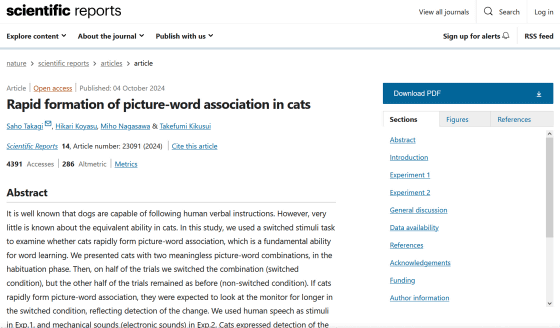Cats may be able to learn to speak faster than human babies

Cats have lived with humans for a long time, and past research has shown that
Rapid formation of picture-word association in cats | Scientific Reports
https://www.nature.com/articles/s41598-024-74006-2

Cats beat babies at word-association game | Science | AAAS
https://www.science.org/content/article/cats-beat-babies-word-association-game
Cats Can Learn Words Faster Than Human Babies, Study Suggests : ScienceAlert
https://www.sciencealert.com/cats-can-learn-words-faster-than-human-babies-study-suggests
Saho Takagi , a special researcher at Azabu University, has previously found that cats can learn the names of humans and other cats they live with. 'I was very surprised,' Takagi told the journal Science. 'This result meant that cats can eavesdrop on human conversations and understand the words without any special training with rewards.'
In a new study, Takagi and his colleagues conducted an experiment to see if cats have the ability to learn human language. A total of 31 cats, including 23 cats living in a cat cafe, participated in the experiment, and they took a language development measurement test called a 'switching task' that was developed for human infants and toddlers aged 8 to 14 months.
The switching task was divided into a 'habituation phase' in which the cat was asked to associate a specific word with a mark, and a 'test phase' to check whether the cat had learned the word.
In the familiarization phase, the cat was shown two animations repeatedly on the laptop screen. The animations were of a 'red sun' and a 'blue and white unicorn' getting bigger and smaller, and the owner or caregiver played a specific coined word in the voice along with the video. In this experiment, the coined word corresponding to the 'red sun' was 'Parumo,' and the coined word corresponding to the 'blue and white unicorn' was 'Keraru.' The familiarization phase continued up to eight times until the cat's time gazing at the laptop decreased by 50% and it was judged that the cat was bored.

After a short break, the subjects entered the test phase, which consisted of a total of four trials. In the test phase, the same patterns as those shown in the familiarization phase ('red sun' and 'Parumo') and 'blue and white unicorn' and 'Keraru') were shown once each, but the same patterns ('red sun' and 'Keraru' and 'blue and white unicorn' and 'Parumo') in which the animations and the corresponding words were swapped were also shown once each.

Cats who saw a different pattern of animation and words from the habituation phase spent an average of 33% more time looking at the screen, suggesting that the cats had learned the association between the animation and the words during the habituation phase.
Surprisingly, most cats were able to learn the animation-word combinations in just nine seconds, whereas 14-month-old infants needed at least 20 seconds to learn them. The team argued that cats may be able to learn words faster than human infants.
In addition, the experiment on human babies had some differences from the experiment on cats this time, such as the fact that the speaker of the words was a stranger and the words were only one syllable long.
'Cats pay more attention to what humans say in their daily lives than we think, and they are trying to understand us,' Takagi told Science.

Related Posts:







